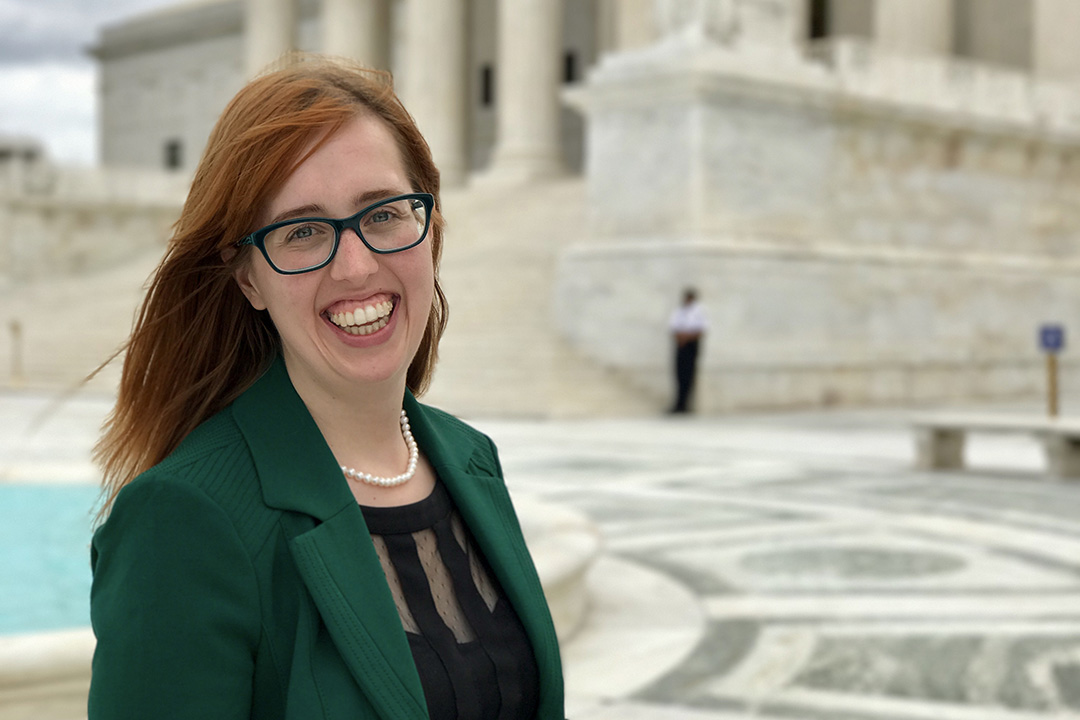On September 4, Carolyn Homer, JD ’12, won a civil rights victory in a ruling against the FBI. The Council on American-Islamic Relations (CAIR), where Ms. Homer is a trial attorney, sued the FBI's Terrorist Screening Center and secured an opinion that the federal terrorist watchlist is unconstitutional.
The complaint alleged that the FBI and other federal government agencies systematically added Muslims to a secret list which caused them issues at airports and border crossings, to have their electronics seized and searched, their associations monitored, and to have all forms of background checks denied. Currently, 4,600 US citizens are on the list of which two dozen were represented by CAIR.
“Being on this list allowed the government to sweep into every area of an individual’s life,” Ms. Homer said.
She said winning cases like the FBI terrorist watchlist lawsuit is a reminder of the power the law has to do good.
“I’m grateful that we have such a civilized way of resolving disputes in America,” Ms. Homer said. “I’m seeing the change, and it’s change that doesn’t just affect the clients in the lawsuit. Often these broad policy challenges are affecting hundreds, thousands, or tens of thousands of other similarly-situated people.”
CAIR was founded in 1994 with the purpose of educating America on the Muslim-American experience and combating stereotypes. The organization has grown to include a litigation department, working on behalf of the Muslim-American community.
As a trial attorney, Ms. Homer handles a long list of litigation matters for her clients including employment discrimination, prison discrimination that prevents Muslims from practicing their beliefs, and watch list and national security cases alleging systematic discrimination against Muslims in the American national security apparatus.
CAIR also challenges state laws that affect Muslims' free speech. In April, Ms. Homer and CAIR won a preliminary injunction against a Texas law that blocks contractors from boycotting Israel. The law had caused a Palestinian-American speech language pathologist to lose her job.
She says the most difficult part of her job is fighting the pervasiveness of Islamophobia.
“It’s the sheer number of phone calls we get each and every day reporting acts of vandalism against businesses, arson at Muslim mosques, and Hijab ripping cases,” Ms. Homer said. “It is a constant battle and even when we have grounds to sue, you know that litigation isn’t the solution. Litigation helps, but what is really needed is societal change and empathy.”
According to CAIR, since 2015 there has been a 400-500% increase in hate crimes against Muslim Americans. A recently published CAIR brief details that between 2014 and June of 2019 a record total of 10,015 anti-Muslim bias incidents accured.
Ms. Homer is an active member of interfaith communities and has held a strong conviction for First Amendment rights since she was young.
"I have loved the Constitution since I was a little girl," she said. "It all started when I would call my older sister at college and hear her talk about the First Amendment with tones of glee."
Then, Ms. Homer said, 9/11 happened. "The day after 9/11 I came to school and in Government class I heard my classmates talking about creating a national Muslim ID card, registries, and travel bans to the Middle East," she said. "I was horrified."
She approached one of her close friends for a copy of the Qur’an so that she could defend him and other Muslim believers.
"I wanted to defend against the ignorance because I knew people maligned my religion all the time, and I was assuming they were doing the same thing to him, his family, and the rest of his faith community," Ms. Homer said.
Prior to joining CAIR, she was an associate at Quinn Emanuel for five years, where she participated in litigation at all levels of the federal government. Ms. Homer focused on intellectual property and First Amendment cases, both areas she specialized in at GW Law.
“When I was in law school, there were two things that I loved. I loved intellectual property law, and I loved First Amendment and constitutional law,” Ms. Homer said. “I worked in IP litigation for a big tech firm for about six years. Then after the 2016 election, I wanted to use my litigation powers for good and represent those whose constitutional rights were in jeopardy.”
Ms. Homer said studying at GW Law presented her with immense opportunities to pursue her interests.
“I’m very grateful to have attended GW Law in the heart of the nation's capital," she said. "It gave me access to internships and to networking opportunities and to top-notch professors that were unparalleled compared to many of my peers."
Ms. Homer said students interested in nonprofit work should get as much litigation experience as possible.
“Public interest organizations don’t have the funding to train you, and they need people who can hit the ground running,” she said. “If what you’re wanting to do is litigation, find a job, whether at a small, mid, or large firm, that does litigation. Get as much courtroom, briefing, research, writing, strategy, and federal rules of civil procedure experience as you can get. Those skills of knowing how to run a case will transfer over to any nonprofit.”
To learn more about CAIR and read updates on their First Amendment cases, visit cair.com.


